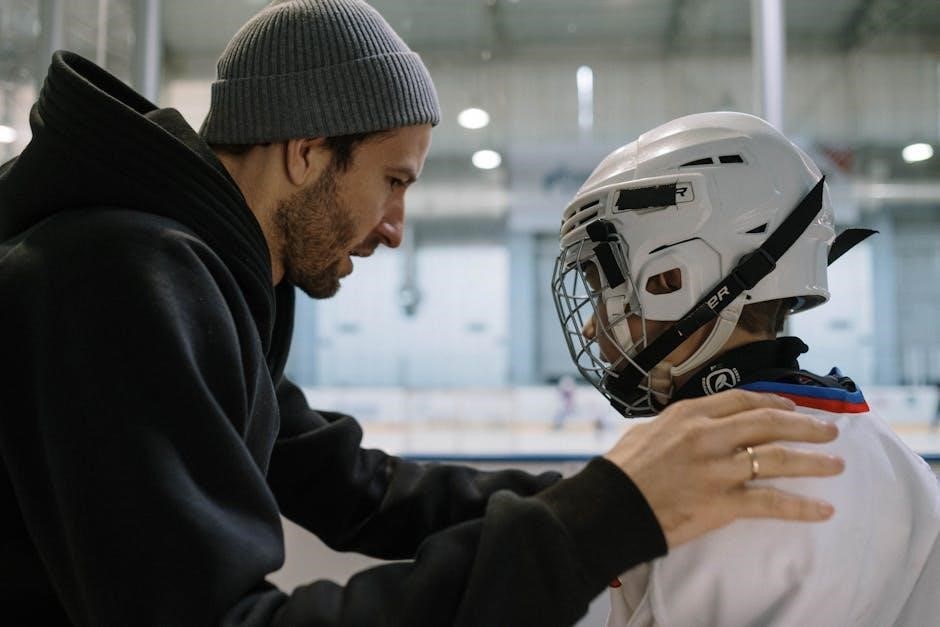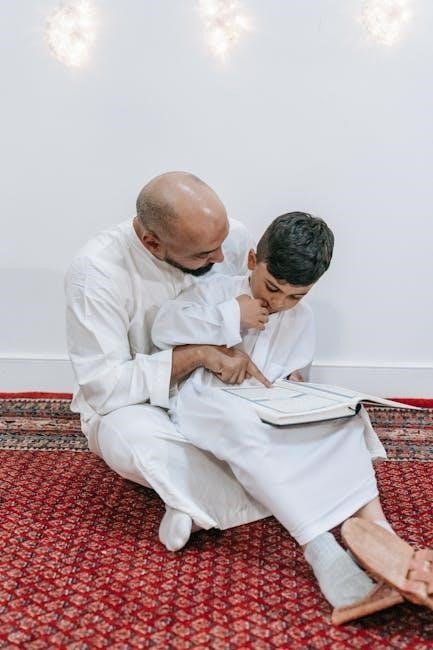
Coach Carter, portrayed by Samuel L. Jackson, is a controversial high school basketball coach known for prioritizing academics over sports, inspiring both admiration and debate among parents and educators. His strict policies, including benching players for poor academic performance, highlight the importance of discipline and education in shaping young lives.
1.1 Who is Coach Carter?
Coach Carter, portrayed by Samuel L. Jackson, is a high school basketball coach known for his strict, unconventional methods. Based on the real-life story of Coach Ken Carter, he gained fame in 1999 for prioritizing academics over athletics. His philosophy emphasizes discipline, hard work, and personal responsibility, often leading to controversy. Parents and educators admire his commitment to helping students succeed beyond sports, while others criticize his tough approach. His story highlights the challenges of balancing athletic success with academic and personal growth, making him a polarizing yet influential figure in education and sports.
1.2 The True Story Behind the Movie
The movie Coach Carter is inspired by the real-life story of Ken Carter, a high school basketball coach in Richmond, California. In 1999, Carter made national headlines by benching his entire team for failing to meet academic expectations. This bold move sparked controversy among parents and the community, but it also highlighted the importance of education over sports. The film captures his struggle to instill discipline and responsibility in his players, showcasing both the challenges and the eventual positive impact on his students’ lives. The true story emphasizes Carter’s unwavering commitment to helping his players succeed beyond the court.
1.3 Coach Carter’s Philosophy on Discipline and Education
Coach Carter’s philosophy centers on prioritizing education over sports, emphasizing that success on the court begins in the classroom. He believes in setting clear academic and behavioral expectations, enforced through contracts signed by players and their parents. Carter’s approach fosters accountability, teaching students that discipline and hard work are essential for long-term success. By benching players for poor academic performance, he underscores the importance of education as a foundation for life. His philosophy extends beyond basketball, aiming to equip students with the skills and mindset needed to thrive beyond high school, making him a polarizing yet impactful figure in their lives.

The Movie Coach Carter: A Parent’s Perspective
The film offers a powerful narrative on balancing sports and academics, inspiring parents to prioritize education while fostering resilience and responsibility in their children through Coach Carter’s example.
2.1 Plot Summary and Key Themes
Coach Carter follows Ken Carter, a high school basketball coach, who benches his entire team for poor academic performance, emphasizing education over sports. The movie highlights themes of discipline, responsibility, and the importance of education, as Carter challenges his players to take their studies seriously while navigating personal struggles. The story explores the tension between athletic success and academic achievement, ultimately inspiring players to grow both on and off the court. Parents will appreciate the strong message about accountability and the value of hard work.
2.2 Mature Content in the Movie
The movie Coach Carter contains mature themes, including teen pregnancy, discussions of abortion, and some profanity. While the film is inspiring, it addresses real-life issues that may require parental discretion. The PG-13 rating reflects these elements, which are integral to the story but could be sensitive for younger audiences. Parents should be aware of these themes to decide if the movie is suitable for their child. The content adds depth to the narrative, highlighting the challenges faced by the characters and the importance of making responsible choices.

2.3 Appropriate Age Group for Viewing
Coach Carter is rated PG-13 due to mature themes, mild violence, and some profanity. Parents should consider their child’s sensitivity and maturity level. While the film’s message is uplifting, scenes involving teen pregnancy and intense basketball conflicts may not be suitable for younger audiences. Tweens and under may find certain topics challenging to grasp or emotionally intense. Older teenagers, however, can benefit from the film’s lessons on responsibility and perseverance. Parental discretion is advised for viewers under 14, as the content deals with real-life issues that may prompt family discussions.

Parenting Lessons from Coach Carter
Coach Carter’s approach emphasizes academic contracts, clear expectations, and consistent discipline, teaching parents to prioritize education while fostering responsibility and accountability in their children.
3.1 The Importance of Academic Contracts
Academic contracts, a cornerstone of Coach Carter’s philosophy, ensure students prioritize education. By requiring players to maintain good grades and attend classes, these contracts teach accountability and responsibility, mirroring real-world expectations. Parents can adopt this strategy by setting clear academic goals, monitoring progress, and enforcing consequences. This approach not only improves academic performance but also fosters a mindset focused on long-term success, emphasizing the value of education over immediate gratification in sports or other activities.
3.2 Setting Clear Expectations for Behavior
Coach Carter’s approach emphasizes the importance of setting clear behavioral expectations, ensuring athletes understand the standards they must meet. By establishing consistent rules and consequences, he fosters accountability and respect. This method encourages players to take responsibility for their actions, both on and off the court. Parents can adopt this strategy by defining clear behavioral guidelines and consistently enforcing them. Such expectations help children develop self-discipline and understand the connection between their choices and outcomes, preparing them for real-world challenges. This structured approach promotes a culture of accountability and mutual respect within families and teams alike.
3.3 The Role of Parents in Supporting Discipline
Parents play a crucial role in reinforcing Coach Carter’s disciplinary methods by maintaining consistent expectations at home. By aligning with the academic contracts and behavioral standards set by Carter, parents can create a unified front, ensuring their children understand the importance of accountability. Active communication between parents and educators fosters an environment where discipline is valued. Parents should encourage open dialogue with their children, supporting their growth while addressing challenges. This collaborative effort helps build resilience and responsibility, echoing Carter’s philosophy that education and discipline are essential for long-term success. Together, parents and educators can empower students to thrive both academically and personally.

Coach Carter’s Approach to Team Management
Coach Carter’s approach emphasizes discipline, accountability, and academics. His method includes benching players for poor performance, ensuring they prioritize education and personal growth over sports success.
4.1 The Impact of Benching the Entire Team
When Coach Carter benched his entire team, it sparked controversy but ultimately emphasized academic responsibility. This bold move forced players to prioritize education, leading to improved grades and a stronger work ethic. Parents and the community were divided, with some criticizing his methods while others praised his commitment to student-athlete success. The incident highlighted the importance of accountability and set a precedent for balancing sports and academics, inspiring both support and debate among educators and families alike.
4.2 Teaching Life Skills Through Basketball
Coach Carter uses basketball as a tool to teach essential life skills, emphasizing teamwork, responsibility, and perseverance. By holding players accountable for their actions on and off the court, he fosters a sense of discipline and accountability. The sport becomes a metaphor for life, where hard work and dedication yield success. Carter’s approach helps players develop resilience, respect, and self-confidence, preparing them for challenges beyond basketball. Parents appreciate how these lessons translate into real-world applications, creating well-rounded individuals capable of balancing sports and academics while building strong character for the future.
4.3 The Concept of “Roots and Wings” in Parenting
Coach Carter’s approach embodies the “Roots and Wings” philosophy, where parents provide stability and nourishment (“roots”) while encouraging independence and growth (“wings”). This balance helps children develop resilience and confidence. By setting clear expectations and fostering accountability, Carter teaches young athletes to navigate challenges responsibly. Parents can adopt this mindset by offering emotional support while allowing children to face setbacks and learn from them. This approach nurtures self-reliance and prepares kids to thrive in an ever-changing world, mirroring Carter’s belief in empowering youth through discipline and trust.

Controversies Surrounding Coach Carter
Coach Carter faced backlash for benching his team over academic issues, sparking debates on prioritizing education over sports and causing community tension.
5.1 Reactions from Parents and the Community
Coach Carter’s strict policies ignited intense reactions. Parents and community members criticized his decision to bench players, arguing it unfairly penalized students and hurt team morale. Others supported his emphasis on academics, believing it set a necessary standard. The controversy divided opinions, with some viewing him as a visionary and others as overly harsh. The school board also intervened, reflecting broader tensions between academic and athletic priorities in education.
5.2 The Debate Over Prioritizing Academics vs. Sports
Coach Carter’s actions sparked a national debate on balancing academics and athletics. Critics argued that sports provide essential life skills, while Carter maintained that education is the true foundation for success. Parents and educators were divided, with some applauding his commitment to academic rigor and others concerned about the impact on student-athletes’ futures. This controversy highlighted the broader challenge of integrating sports and education effectively, ensuring students thrive both on and off the field.
5.3 The Role of the School Board in the Conflict
The school board played a pivotal role in the conflict sparked by Coach Carter’s strict academic policies. Initially, they supported his methods but faced mounting pressure from parents and the community. The board eventually intervened, challenging Carter’s authority and questioning his approach. This tension underscored the delicate balance between administrative oversight and a coach’s autonomy. The board’s involvement highlighted the broader struggle in educational institutions to prioritize academics while maintaining athletic programs, ultimately leading to a resolution that sought to address both student success and community expectations.

Practical Parenting Tips Inspired by Coach Carter
Coach Carter’s approach emphasizes breaking challenges into manageable steps, encouraging risk-taking, and fostering a growth mindset. These strategies help parents guide their children effectively, promoting resilience and academic success.
6.1 Breaking Down Challenges into Manageable Steps
Coach Carter’s method of dividing large tasks into smaller, manageable steps helps parents guide children through complex challenges. By focusing on incremental progress, kids build confidence and problem-solving skills. This approach, seen in his academic contracts, ensures accountability and gradual improvement, making it easier for young people to understand and achieve their goals without feeling overwhelmed.
6.2 Encouraging Risk-Taking and Learning from Setbacks
Coach Carter’s approach emphasizes embracing challenges and learning from failures. By benching his team for poor academic performance, he taught resilience and accountability. Parents can adopt this mindset by encouraging kids to take calculated risks and view setbacks as growth opportunities. This fosters confidence and adaptability, essential for overcoming life’s obstacles. Carter’s philosophy reminds us that mistakes are part of the learning process, and supporting children through these experiences helps them develop a stronger sense of responsibility and perseverance.
6.3 Fostering a Growth Mindset in Children
Coach Carter’s philosophy highlights the importance of fostering a growth mindset in children. By emphasizing effort over talent and learning from setbacks, he inspires resilience. Parents can encourage this by praising hard work, not just success, and supporting their children through challenges. Carter’s approach of benching players for poor academics teaches that growth comes from accountability and perseverance. This mindset helps children believe in their ability to improve, leading to lifelong confidence and adaptability. His methods remind parents that failure is a stepping stone to success, shaping strong, motivated individuals.

The Movie’s Rating and Content Advisory
Rated PG-13, Coach Carter addresses mature themes, including teen pregnancy and profanity. Violence, mild sexuality, and drug references are present, making parental discretion essential for younger viewers.
7.1 PG-13 Rating and Reasons Behind It
Coach Carter carries a PG-13 rating due to its mature themes, including mild violence, teen partying, and brief sexual content. The film also contains profanity and references to drugs and alcohol, making it unsuitable for younger audiences without parental guidance. These elements contribute to its PG-13 classification, ensuring viewers are aware of the content before watching.
7.2 Sex, Violence, and Profanity in the Film
Coach Carter includes mild sexual content, such as discussions of teen pregnancy and abortion, along with some violence, including altercations and intense basketball scenes. Profanity is present, with moderate use of strong language. These elements are integral to the story, reflecting real-life challenges faced by the characters, but may require parental discretion for younger viewers.
7.4 Drug and Alcohol References in the Movie
The film includes scenes with teen partying, alcohol consumption, and drug references, adding to its PG-13 rating. These depictions are realistic, showing the pressures and temptations faced by high school students, but may concern parents of younger viewers. The content is not overly explicit but provides a truthful portrayal of adolescent life, making it essential for parents to assess their child’s maturity level before watching.

Parent Reviews and Recommendations
Parents praise the film’s inspiring message for teenagers but caution against its mature themes, recommending it for older kids while advising discretion for younger viewers.
8.1 Positive Feedback from Parents
Parents describe Coach Carter as a “great movie for teenagers” and an “inspiring” film that fosters positive change. Many appreciate its focus on accountability, hard work, and academic priorities, calling it a “feel-good” story that resonates with both teens and adults. The movie’s emphasis on personal growth and overcoming challenges is widely praised, making it a valuable watch for families seeking motivational content. Its ability to balance sports with life lessons earns it high marks as a film that encourages reflection and meaningful conversations;
8.2 Concerns and Caution for Younger Viewers
While Coach Carter is inspiring, parents are advised to exercise caution with younger viewers due to mature themes. The film includes discussions of teen pregnancy and abortion, mild violence, and some profanity, which may not be suitable for tweens or under; Scenes of teen partying and references to drug use also warrant parental discretion. The PG-13 rating reflects these elements, making it essential for parents to assess their child’s sensitivity and readiness for such content. Open discussions after viewing are recommended to address any concerns or questions younger audiences may have.
8.3 Suggestions for Family Discussions After Watching
After watching Coach Carter, families can discuss the importance of education, personal responsibility, and the consequences of risky behaviors. Parents should ask open-ended questions about the characters’ choices, such as “Why do you think the players initially resisted Coach Carter’s rules?” or “How did the team’s academic success impact their lives?” Discussions can also focus on themes like perseverance, accountability, and the value of hard work. Encourage reflection on how the movie’s lessons apply to real-life challenges, such as balancing school and extracurricular activities. This can help children develop a deeper understanding of the film’s inspirational message.

The Legacy of Coach Carter
Coach Carter’s legacy endures as a symbol of resilience and determination, inspiring educators and parents to prioritize academic excellence alongside athletic achievements, shaping generations to come.
9.1 The Long-Term Impact on Students and the Community
Coach Carter’s strict policies initially sparked controversy but ultimately fostered a culture of accountability and academic prioritization. Students learned the value of hard work and responsibility, translating to improved academic performance and life skills. The community, though initially divided, came to admire his commitment to their children’s future. His approach not only transformed individual lives but also set a precedent for balancing sports and education, leaving a lasting legacy of empowerment and resilience in Richmond.
9.2 Coach Carter’s Influence on Modern Coaching Techniques
Coach Carter’s unconventional methods, such as benching players for academic underperformance, inspired a shift in modern coaching. His emphasis on accountability and education over sports success encouraged coaches to prioritize holistic development. Many adopted his strategy of academic contracts, fostering a culture of responsibility. Carter’s approach demonstrated that athletes could excel both on the court and in the classroom, reshaping how coaches balance sports and academics. His legacy continues to influence coaching techniques, promoting a more balanced and education-focused approach to youth sports.
9.3 The Enduring Message of the Movie
The enduring message of Coach Carter lies in its powerful themes of accountability, education, and personal growth. The film emphasizes that success is not just about winning but about character, hard work, and responsibility. It challenges parents and educators to prioritize academic excellence and emotional development over fleeting athletic glory. The movie’s core lesson—that education is the foundation for a better future—resonates deeply, inspiring parents to set high expectations and support their children in becoming well-rounded individuals. This timeless message continues to motivate audiences, making Coach Carter a lasting inspiration for families worldwide.